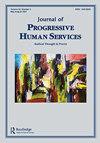The Case for Prefigurative Feminist Organizing
IF 0.8
Q1 SOCIAL WORK
引用次数: 3
Abstract
In 1979, president Jimmy Carter appointed economist Paul A. Volcker chairman of the Board of Governors of the United States (US) Federal Reserve System. Volcker was tasked with tackling inflation issues—seen as essential to the growth of the US and world economies—consequently ushering in policies that would reverberate around the world for decades. Volcker was not alone in the pursuit of radically modifying the monetary policy, as changes in economies were occurring elsewhere. China began to liberalize its economy toward more market-friendly positions, the United Kingdom (UK) began to battle its own working class through the suppression of union labor—as well as tackle its own issues of inflation—and the election of US president Ronald Reagan in 1980 emboldened Volcker’s ideas through policies that attacked organized labor, deregulated industry, and entitled global financiers (Harvey, 2005). These Western policies and ideas were eventually calcified through the collapse of the Union of Soviet Socialist Republics (USSR) in 1991 and the declaration of the so-called “end of history” (Fukuyama, 1992). The term that has come to describe this phenomenon of policies that deregulate industry, attack organized labor, social welfare, and empower financiers is neoliberalism. Neoliberalism may be conceptualized as a set of economic policies and ideas that espouse the rule of the “free”market, cutting and/or privatizing public social services, deregulating existing markets, and eliminating the concepts of community and the global public good (Martinez & Garcia, 1996). Since the late 1970s, neoliberalism has been the cornerstone of the global economic system, and the repercussions of its policies have not gone unnoticed. According to Harvey (2005), neoliberal policies have engendered and exacerbated social and economic inequalities, wealth concentration, privatization, social, political, economic, and environmental crises, as well as the “commodification of everything” (p. 165). Social movements and community organization practices that have occurred within this period have been marked as uniquely resistant to these policies through their targeting of global economic systems via various localized lenses such as race, sexuality, diagnosis, and gender (Shepard, 2002). Despite more feminist community organization practicemethods being highlighted in recent decades (East, 2000; Ewig & Ferree, 2013; Gutierrez & Lewis, 1994; Hyde, 1996, 2000; Mizarhi & Greenawalt, 2017; Mizrahi, n.d.; Shepard,预设女性主义组织的案例
1979年,吉米·卡特总统任命经济学家保罗·A·沃尔克为美国联邦储备系统理事会主席。沃尔克的任务是解决被视为对美国和世界经济增长至关重要的通货膨胀问题,从而推出将在世界各地产生数十年影响的政策。沃尔克并不是唯一一个寻求从根本上修改货币政策的人,因为其他地方的经济也在发生变化。中国开始向更利于市场的立场开放经济,英国开始通过镇压工会劳工来对抗自己的工人阶级,并解决自己的通货膨胀问题。1980年美国总统罗纳德·里根的当选通过打击有组织的劳工、放松管制的工业、,题为“全球金融家”(Harvey,2005年)。这些西方政策和思想最终因1991年苏维埃社会主义共和国联盟(苏联)的解体和所谓“历史终结”的宣布而固化(Fukuyama,1992)。用来描述这种放松工业管制、打击有组织的劳工、社会福利和赋予金融家权力的政策现象的术语是新自由主义。新自由主义可以被概念化为一套支持“自由”市场规则、削减和/或私有化公共社会服务、解除对现有市场的管制以及消除社区和全球公共利益概念的经济政策和思想(Martinez&Garcia,1996)。自20世纪70年代末以来,新自由主义一直是全球经济体系的基石,其政策的影响并没有被忽视。Harvey(2005)认为,新自由主义政策造成并加剧了社会和经济不平等、财富集中、私有化、社会、政治、经济和环境危机,以及“一切商品化”(第165页)。这一时期发生的社会运动和社区组织实践被标记为对这些政策的独特抵制,因为它们通过种族、性取向、诊断和性别等各种本地化视角瞄准了全球经济体系(Shepard,2002)。尽管近几十年来强调了更多的女权主义社区组织实践方法(East,2000;Ewig和Ferree,2013;Gutierrez和Lewis,1994;Hyde,19962000;Mizarhi和Greenawalt,2017;Mizrahi,n.d.;Shepard,
本文章由计算机程序翻译,如有差异,请以英文原文为准。
求助全文
约1分钟内获得全文
求助全文
来源期刊

Journal of Progressive Human Services
SOCIAL WORK-
CiteScore
3.20
自引率
8.30%
发文量
14
期刊介绍:
The only journal of its kind in the United States, the Journal of Progressive Human Services covers political, social, personal, and professional problems in human services from a progressive perspective. The journal stimulates debate about major social issues and contributes to the development of the analytical tools needed for building a caring society based on equality and justice. The journal"s contributors examine oppressed and vulnerable groups, struggles by workers and clients on the job and in the community, dilemmas of practice in conservative contexts, and strategies for ending racism, sexism, ageism, heterosexism, and discrimination of persons who are disabled and psychologically distressed.
 求助内容:
求助内容: 应助结果提醒方式:
应助结果提醒方式:


